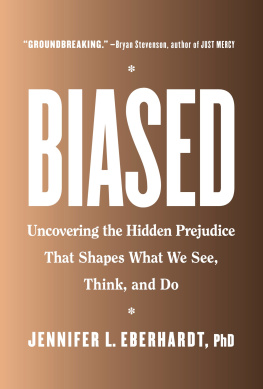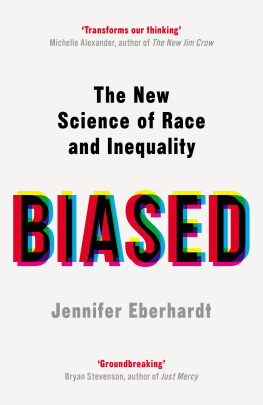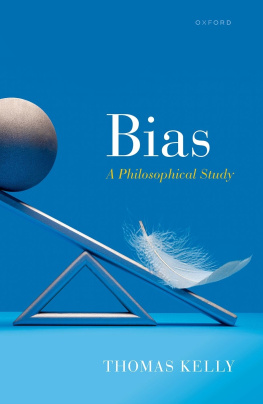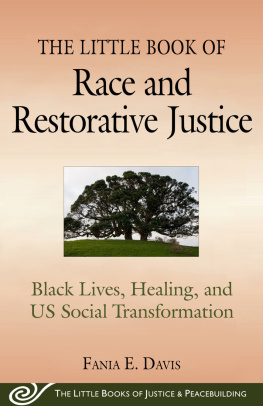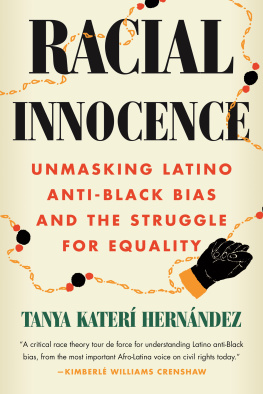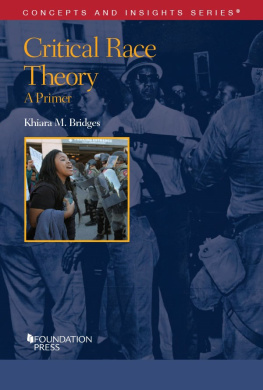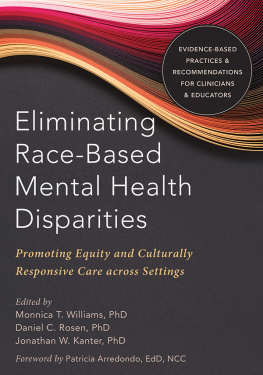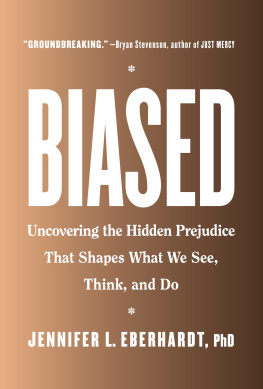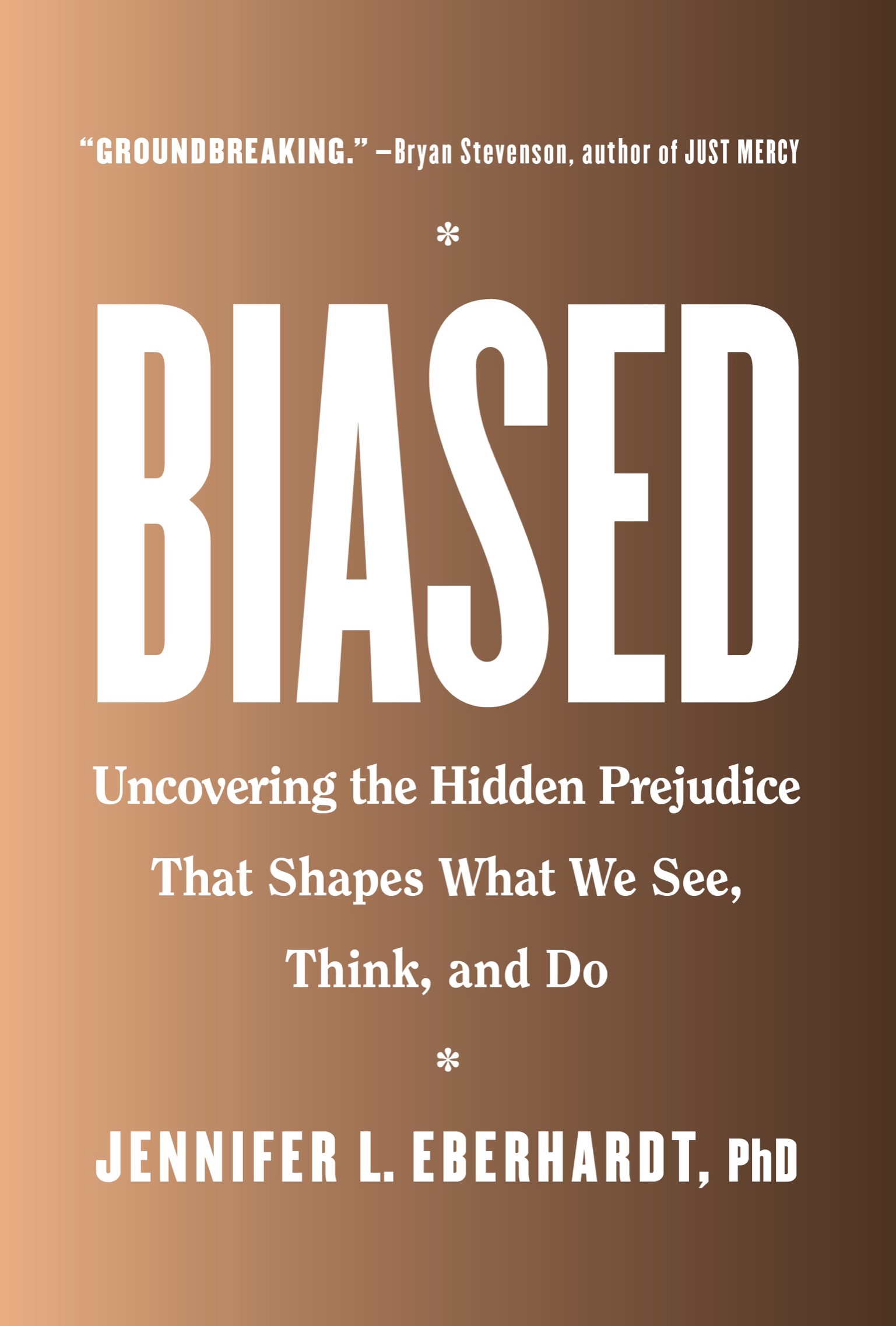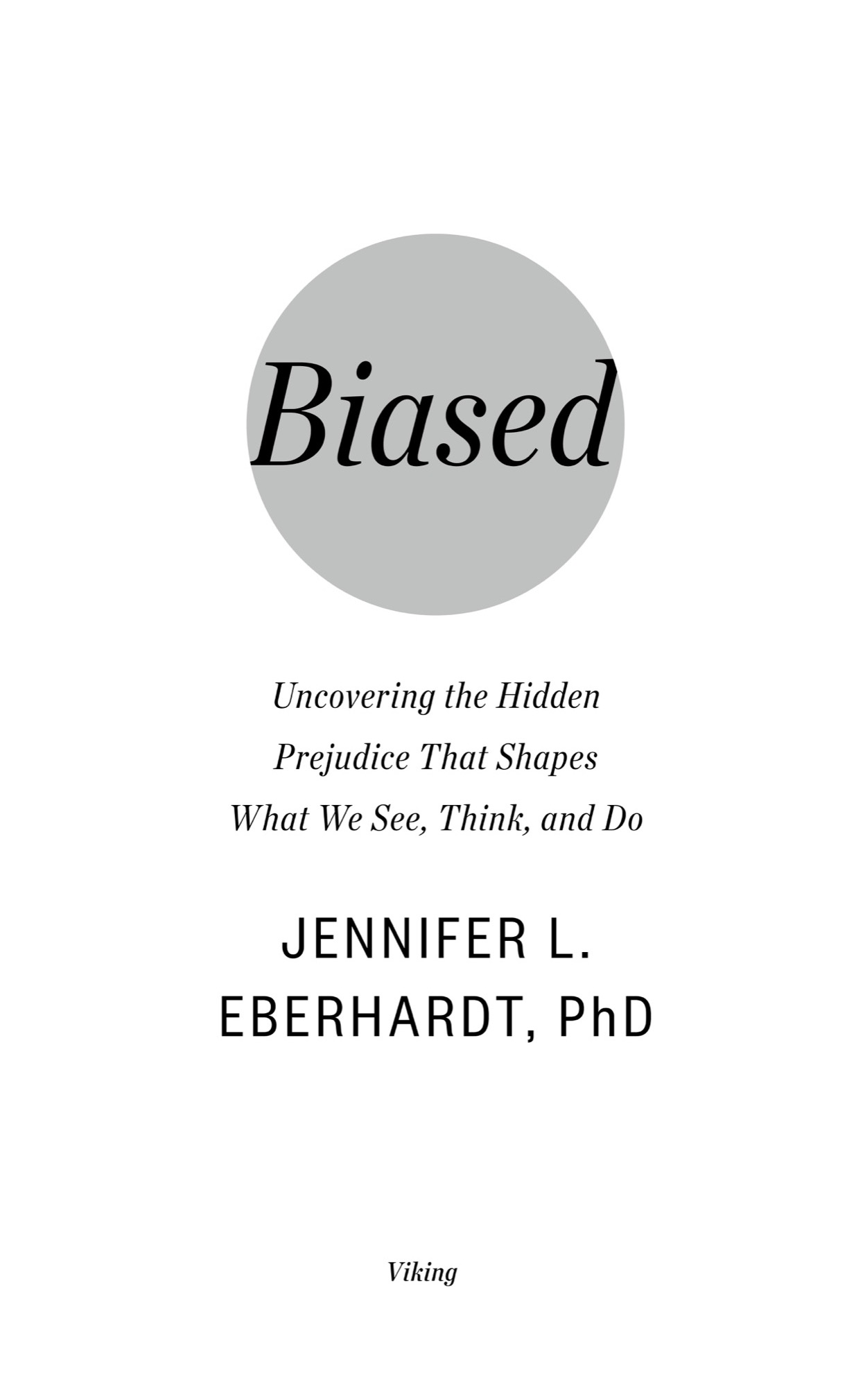VIKING
An imprint of Penguin Random House LLC
penguinrandomhouse.com
Copyright 2019 by Jennifer L. Eberhardt
Penguin supports copyright. Copyright fuels creativity, encourages diverse voices, promotes free speech, and creates a vibrant culture. Thank you for buying an authorized edition of this book and for complying with copyright laws by not reproducing, scanning, or distributing any part of it in any form without permission. You are supporting writers and allowing Penguin to continue to publish books for every reader.
Illustration credits appear on .
Library of Congress Cataloging-in-Publication Data
Names: Eberhardt, Jennifer L. (Jennifer Lynn), author.
Title: Biased : uncovering the hidden prejudice that shapes what we see, think, and do / Jennifer L. Eberhardt. PhD.
Description: New York : Viking, [2019] | Includes index.
Identifiers: LCCN 2018051011 | ISBN 9780735224933 (hardcover) |
ISBN 9780735224940 (ebook)
Subjects: LCSH: Prejudices. | Discrimination. | Racism.
Classification: LCC BF575.P9 E34 2019 | DDC 303.3/85--dc23
LC record available at https://lccn.loc.gov/2018051011
Names of certain individuals have been changed to protect their privacy.
While the author has made every effort to provide accurate internet addresses and other contact information at the time of publication, neither the publisher nor the author assumes any responsibility for errors or for changes that occur after publication. Further, the publisher does not have any control over and does not assume any responsibility for author or third-party websites or their content.
Version_2
For my love, Rick, who inspires me to do more and to move further than I ever thought I could
CONTENTS
A journey is called that because you cannot know what you will... do with what you find, or what you find will do to you.
James Baldwin
Introduction
I walked in through a sea of navy-blue uniforms. The auditorium was filled to capacity, with 132 sworn members of the Oakland Police Department sitting motionless with perfect posture: erect, arms crossed. As I walked down the aisle to take the stage, I could not see their faces, but I already knew what they were thinking.
The road to this particular presentation was a long one. The police force was still recovering from a major scandal that had left a legacy of distrust in the community. I was just wrapping up a two-year report that was about to be released to the publicone of the final steps required by the federal oversight team brought in to investigate extensive civil rights violations by members of this departmentand I didnt want the police to be blindsided by our findings. Many in the community were calling for an end to racial profiling. They wanted fair treatment. They were demanding justice. Many in the police department felt they were delivering that justice every daysometimes at great sacrifice. I wanted to help the officers to understand the insidious ways in which implicit bias could act on human decision making, despite the officers noble intentions and deliberate efforts.
Reporters were pressuring me to discuss our findings before the report was released, but I couldnt; there was too much at stake. I first wanted the department to be prepared and to be willing to work with our team as they crafted solutions to any problems the report would reveal.
I was tiredexhausted, reallyfrom working on the report around the clock for months, to the neglect of my teaching, my husband, and our three sons. As I marched up the aisle, I could feel a chill in the room.
I made it to the stage. Although not exactly as modern or as high-tech as the classrooms at Stanford where I normally taught, the auditoriumwith its wood-paneled walls and rows of cushioned red metal chairsseemed familiar enough. I looked out at the faces in the crowd, searching for a connection. I found every face expressionless, their eyes distant. Each officer wore a crisp, clean uniform over a bulletproof vest. At the waist was a duty belt holding the essential tools of their trade: handcuffs, Taser, OC pepper spray, and Glock 17 9 mm firearm. The officers looked ready for duty, but no one seemed ready to engage with me.
For the first time in my career, I was facing a hostile crowd. There was no booing or yelling. There were no verbal complaints of any kindjust a steely silence that was more eloquent than any words. I tried to make a few jokes. Nothing landed. I led them through an interactive shootdont shoot simulation, which was always a crowd-pleaser. The exercise fell flat. I showed a few movie clips that in other places triggered bursts of laughter. Still nothing.
Finally, I caught the eye of LeRonne Armstrong, a captain whom Id worked with before on trainings designed to improve police-community relations. I knew he understood the importance of delivering this message to law enforcement. I was relieved to see his face, until I realized that his expression was one of concern for me. He was looking around the crowd with the same worry I was trying not to let show onstage. I saw him shifting uncomfortably in his seat. How, I wondered, can I possibly deliver this training ten more times to units across the department when Im not really sure whether I can make it through this first session?
Eventually, I stopped with the lessons, and the data graphs, and the images, and the jokes, and the movie clips. I decided to veer off my usual script and share a personal story.
I explained that some years ago my son Everett and I were on a plane. He was five years old, wide-eyed, and trying to take it all in. He looked around and saw a black passenger. He said, Hey, that guy looks like Daddy. I looked at the man, and truth be told, he did not look anything like Daddynot in any way. I looked around for anyone else Everett might be referring to. But there was only one black man on the plane.
I couldnt help but be struck by the irony: the race researcher having to explain to her own black child that not all black people look alike. But then I paused and thought about the fact that kids see the world differently from adults. Maybe Everett was seeing something that I missed. I decided to take another look.
I checked the guys height. No resemblance there. He was several inches shorter than my husband. I studied his face. There was nothing in his features that looked familiar. I looked at his skin color. No similarity there either. Then I took a look at his hair. This man had dreadlocks flowing down his back. Everetts father is bald.
I gathered my thoughts and turned to my son, prepared to lecture him in the way that I might inform an unobservant student in my class. But before I could begin, he looked up at me and said, I hope that man doesnt rob the plane.
Maybe I didnt get that right. What did you say? I asked him, wishing I had not heard what I heard. And he said it again, as innocently and as sweetly as you can imagine from a bright-eyed boy trying to understand the world: I hope he doesnt rob the plane.
I was on the brink of being upset. Why would you say that? I asked as gently as I could. You know Daddy wouldnt rob a plane.
Yes, he said. I know.
Well, why did you say that? This time my voice dropped an octave and turned sharp.
Everett looked up at me with a really sad face and said very solemnly, I dont know why I said that. I dont know why I was

